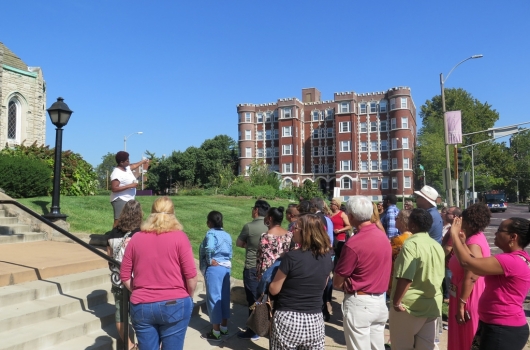Walking the Delmar Divide
 Rev. Dr. Dietra Wise Baker leads 2018 SENT Seminar participants on a walk of the Delmar Divide in St. Louis.
Rev. Dr. Dietra Wise Baker leads 2018 SENT Seminar participants on a walk of the Delmar Divide in St. Louis.
He replied, “Whether he is a sinner or not, I don’t know. One thing I do know. I was blind, but now I see!” (John 9:25)
John Chapter shares a familiar story of a man, born blind, whom Jesus heals. The story seems to be preoccupied with finding fault, finding a reason why the man was blind. Did he or his parents do something that made him blind? The same preoccupation follows Jesus’ healing work: “How can a sinner perform such miracles?” they ask. The story points to the very human dilemma of having physical sight while our perspectives rob us of seeing the truth.
The Delmar Divide in St. Louis is a place our community regular practices this blindness and invisibility of neighbor. The Delmar Divide is a historic street in the city of St. Louis, dividing the city into north and south. NBA groups walk the divide so we can better “see” what locals miss driving every day. The average home values north of Delmar are $78,000, while south of Delmar, the values are $310,000 on average. The Delmar Divide is segregated by race: 99% of the residents in the north are black, and 70% of residents in the south are white.
When you walk the Divide, you literally cross the street and you can see the neighborhood changes. Our conversation is not to be preoccupied with fault and blame, but should examine the larger historic, economic, and political forces that design “Delmar Divides” in every city in America. The conversation is also not just about how we can build better programs to meet the needs created by these forces, but how do we organize enough community power to resist, reform, and reimagine our life together in the world God gifted?
The first step is simple. It is to begin to see. To begin to realize we are often born blind to forces that shape our life together. The walk through the Delmar Divide is practice. It is invitation to take a walk in our own communities and to see.
“One thing I know. I was blind, but now I see!”
Print-friendly version here >>
As the health and social services general ministry of the Christian Church (Disciples of Christ), the National Benevolent Association partners with congregations, regions, general ministries, and a variety of Disciples-related health and social service providers to create communities of compassion and care. Founded in 1887 by six women responding to the needs of the day and on their doorsteps, for more than 130 years the NBA has continued to serve “the least of these.”